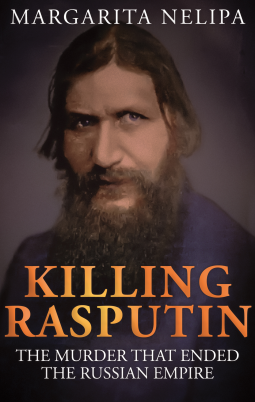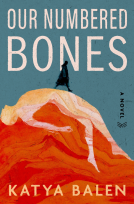
Killing Rasputin
The Murder That Ended The Russian Empire
by Margarita Nelipa
This title was previously available on NetGalley and is now archived.
Send NetGalley books directly to your Kindle or Kindle app
1
To read on a Kindle or Kindle app, please add kindle@netgalley.com as an approved email address to receive files in your Amazon account. Click here for step-by-step instructions.
2
Also find your Kindle email address within your Amazon account, and enter it here.
Pub Date May 30 2017 | Archive Date Sep 23 2017
Description
At last a book about the so-called “Mad Monk” of Imperial Russia that lays to rest the myths and reveals the truth about one of the most controversial characters in human history while exploring the impact his murder had on a dynasty, a people, and a country.
Written in three parts, KILLING RASPUTIN begins with a biography that describes how a simple unkempt “holy man” from the wilds of Siberia became a friend of Emperor Nicholas II and his empress, Alexandra, at the most crucial moment in Russian history. Part Two examines the infamous murder of Rasputin through the lens of a “cold case” homicide investigation. And lastly, the book considers the connection between a cold-blooded assassination and the revolution that followed; a revolution that led to civil war and the rise of the Soviet Union.
Unique about this book on Rasputin, is that the author combines Russian heritage (her parents were forced out of Russia during World War II and arrived as refugees in Australia in 1948) with medical science and legal training. Nelipa relied on Russian-language sources that she translated rather than depend on the interpretations of others. Her primary sources include police documents and witness testimonies, an autopsy report, diaries, letters and memoirs written in their native language by the participants in these historic events. Secondary sources include Russian-languages newspapers and other publications from that era. The narrative is copiously referenced and augmented with photographs (including graphic forensic photographs) and other documents, some of them published here for the first time.
Step into the imperial court of a 300-year-old dynasty in its final days with one of the most fascinating characters ever to grab our imaginations, judge whether Margarita Nelipa makes her case regarding his death, and if you agree that it was “the murder that ended the Russian empire.”
Marketing Plan
Price discounts and standard return policies are available for bookstores through Ingram. Others wishing to order quantities of 20 or more may contact us directly at info@wildbluepress.com for discount pricing.
Available Editions
| EDITION | Ebook |
| ISBN | 9781942266655 |
| PRICE | 2.99 |
Average rating from 24 members
Featured Reviews
Excellent read about Rasputin-the myths and the real truth. I will admit it was a little bogged down in facts and figures and I was bored in some chapters. But I would recommend this as a read!
 Kathleen D, Reviewer
Kathleen D, Reviewer
“Aristocrats viewed Rasputin as engaging and modest, traits that allowed him to mix amongst them. Despite his clothing and unusual appearance, it was his sincerity that appealed to them. His pragmatic thoughts became wisdom, which contrasted with the esoteric mysticism that pervaded high society. The problems stemmed from rumors that spoke of Rasputin’s divine gift of healing and prophesizing. Those supposed qualities made him immensely popular.”
Those very qualities later became questionable and it wasn’t long before he was seen as vulgar, beneath the very people who first were enthralled by Rasputin. That he was a character is partially due to myths, rumors and the mysteries surrounding his life, as well as his death. I’ve always had an interest in the doomed Romanov family and the man that they welcomed into their bosom. A wandering msytic, self-proclaimed holy man, healer, or was he a dirty, ignorant peasant not fit to lick the boots of high society? It depends on which books you read, whose stories you believe. Here, Margarita Nelipa skips speculation and studies sold evidence. From his humble beginnings to befriending Emperor Nicholas II and his family, the murder of Rasputin and the ever changing tumult history and revolution that followed, this book explores it all. Who wanted Rasputin dead? Who didn’t?
How fast his fall, media campaigns against him, exposing him as a charlatan, questioning his belief in natural remedies. Of course Rasputin was a part of a political storm, simply being a part of high society during a hot time in Russia’s history. With lies circling about Rasputin’s sexual ‘exploits’ as noted in this book, the Empress too was smeared. Gossip, however whispered, can be the downfall of many. The truth was that the young Tsesarevich Alexei Nikolaevich was better when Rasputin was near, and what mother, desperate to keep her child healthy and of this earth wouldn’t have faith in his presence?
Taking fabrications and using common sense and logic to find truth, much of what was said to damage Rasputin were impossibilities, simply for his station in life. Unfortunately Rasputin wasn’t one to challenge the falsities written about him, being a holy man. Maybe he wasn’t all the amazing, colorful, wild things he has been accused or praised (depending who you ask) of being, but he has held our fascination for over a century.
Which version is to be believed of his murder? Who masterminded the crime? What brought these conspirators together? Was Rasputin lured to his death, believing he was meeting with Nikolai II’s niece? With accounts, eye witnesses, Nelipa finds the holes and shares them with the reader. What did the British have to do with anything? Did they really believe Rasputin was an ‘evil influence’ on Russia and it’s people? As stated in the book, “Once the Russians eliminated Rasputin, they allegedly steered back onto the correct (British) course and continued fighting the war.” Who murdered him is known, but what were the triggers?
The people were turning on the emperor, as were the aristocrats, feeling the rupture between the dynasty and the Russian people could be laid at Rasputin’s peasant feet. They believed it was Rasputin that was guiding them, and he had to go. All of this is well known, but not everyone is aware of why Alexandra Fyodorovna was vastly different from other aristocrats. Already there were criticisms aimed at her, for enjoying her motherly duties, more consumed by love for her children than the social scene, surely her bond with Rasputin fed the fire. The sad diary entries shared throughout this book are nothing short of heartbreaking.
Rasputin was an outsider, many felt he weaseled his way in, bending the ear of the family in ways others of higher station never could. That in itself is enough to feed hate. It’s a fantastic gathering of material that sheds light on the life and death of Rasputin, and the influence he had on history. Sorting through the murky depths of lies and truth, it is an eye opening read. Certainly the fiction of Rasputin was far more interesting than the reality, but you cannot dispute facts. I always believed him to be a monk, a mystic, a psychic- I have heard everything, but this book lays much of it to rest. He wasn’t the depraved sex craved monster some have painted him, he was despised by the wealthy, the prominent and who can fight the powers that be when they so chose to turn on you? No one then and likely no one now. Time is a funny thing, truth has a way of crawling out of the dark tunnels of the past but not without the attention, blood, sweat and tears of writers like Margarita Nelipa. I am not an expert on Russian history but this book has changed the things I thought I knew about Rasputin.
Available Now
WildBlue Press
 Kimberly O, Educator
Kimberly O, Educator
Margarita Nelipa presents a very thorough and meticulously researched study of Rasputin's murder and subsequent investigation. Ms. Nelipa packed every chapter with her own translations of primary source material. At times, the narrative was weighed down by cited material (there were over 1800 endnotes).
Ultimately, this is a thoughtful study of Rasputin including his relationship with the imperial family, the political chaos that centered around him, his murder, and the subsequent investigation. I particularly enjoyed Ms. Nelipa's analysis of the autopsy.
Killing Rasputin requires a bit of work to get through, but it is a worthwhile endeavor
 Mandy J, Reviewer
Mandy J, Reviewer
Wonderfully immersive, well-researched and well-written account of Rasputin’s murder and the events leading up to it.
 Karen L, Reviewer
Karen L, Reviewer
I've been interested in the last tzar for years and have read a great deal about the tzar his family and the circle surrounding him I could never understand why Rasputin managed to integrate so much into a family that was so isolated the book Showed how charismatic Rasputin actually Was and how much they relied on hjm it is fascinating reading and would i highly recommend it to anyone who has an interest in that part of Russian history
I received a copy of this book for a fair and honest review from netgallery
 catherine h, Reviewer
catherine h, Reviewer
I've always been told those at the very top and those at the very bottom have a lot in common; The Russian royal family, their friends and Rasputin were a perfect, if deadly, fit. Rasputin's death always leaves me awed, but laughing- I mean, his murderers did everything they could to kill him and the guy just would not die! Ineptitude on their part or immortal on his, amazing. Nicholas always struck me as an ineffectual leader. Wasn't very smart on his part to leave Alexandra and Rasputin in charge for even an hour. Seems to me he would have listened a bit harder to his subjects.... Anyway, the book covers a lot of territory and has more detail than anyone but the most die hard fans of the story will care about. It's a shame the kids were executed along with the parents. seems someone could have stepped in and just forced them into exile as the royals everywhere were about to be washed up anyway. I know WW1 wasn't brought on by their death, but revolution seems to have been in the air everywhere- sick of royals, I suppose, and everyone wanting more freedom fro their sort. Interesting read, but mainly for folks really into it.
Readers who liked this book also liked:
Rachel Joyce
Historical Fiction, Literary Fiction, Women's Fiction


















